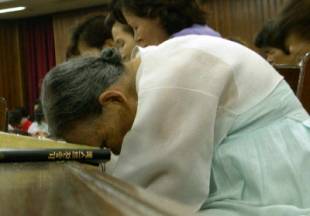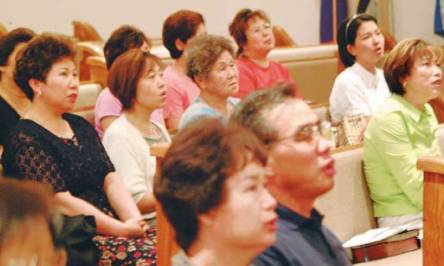
back

|
 |

Employers Oppose Raising Retirement Age
By Kim Min-hee and Kim Sung-mi, The Korea Herald
January 28, 2004
Business organizations have voiced strong opposition to the governmentís plan to set the legal retirement age at 60 beginning in 2008, saying it runs counter to market principles and is unfair to businesses under the current pay system.
The Korea Chamber of Commerce and Industry said in a statement that the measure, which the government drew up to deal with an ageing society, infringed on corporate rights to personnel management.
The chamber also said the measure was unrealistic since most employees leave companies before the average retirement age of 57. Retirement ages are set by companies according to agreements with their employees.
According to a white paper on employment, only four out of 1,000 company workers left their jobs in 2002 because they reached retirement age.
The measure would end up benefiting only those in the public sector where the retirement age was legally guaranteed, the chamber said.
The Korea Employers Federation said that the measure was unfair to businesses under the present wage system, calling on the government to come up with a more comprehensive approach to ensure that the elderly can long remain in the job market rather than at a particular company.
Most Korean companies run with a reward system under which a personís pay increases based on the time spent on the job.

The federation said that the government should replace the seniority-based pay system with a more productivity-based one before it pursues any discussion on extending the legal retirement age.
"The biggest obstacle to retaining elderly employees for employers is the heavy financial burden, because to keep an elderly worker, it can cost up to three times more compared to hiring a new employee," said Ha Sang-woo, a researcher at the federation.
Ha said the adoption of "wage-peak system" could be one way to deal with unemployment among the elderly but it is hardly a permanent solution.
Under the wage-peak system, which some Korean companies already practice, companies guarantee employment until a certain age limit in exchange for less pay during the latter years of work.
He said that Korea needs to expand the absolute demand base for elderly workers by designating more sectors that would be required to fill a number of jobs with older workers.
Business organizations have called the governmentís announcement absurd as it comes at a time when even those in their 30s and 40s are battling fears of being laid off and a large portion of college graduates cannot find jobs.
The nationís employment situation is at one of its worst in years, with youth unemployment (15-29) reaching 8.6 percent, more than twice the average unemployment rate.
Some officials have raised suspicions that the governmentís announcement of the measure is politically motivated ahead of the parliamentary elections in April.
Despite business objections, some have welcomed the government announcement as necessary to adjust to the nationís fast-changing demographic structure and deal with the rising unemployment problem among the elderly.
Korea is one of the fastest aging countries in the world. According to the Korea Labor Institute, Korea will become an "aged" society by 2022 with those aged 65 and older exceeding 14 percent of the population. The birthrate is at an historical low, with the average couple having 1.17 children in 2002. A society is considered to be ageing when 7 percent of the population is 65 years or older.
Labor organizations have voiced general support for the extension of the legal retirement age but stressed that the proposed scheme for "less pay for more years of work" should not be abused by employers to cut costs.
To lessen the financial burden on businesses due to a raised legal retirement age, the government suggested introducing a scheme where workers agree to less pay for extra years of work after they reach retirement age.
"The nationís wage system is already made to peak for those in their 40s and rapidly become lower in the 50s," said an official at the Korean Confederation of Trade Unions, one of two main labor groups.
The government scheme to adjust wages in exchange for a guarantee of more work, the official said, would provide an excuse for companies to further cut wages.
The Federation of Korean Trade Unions also said in a statement that enforcing a new legal retirement age would not be effective in consideration of the current employment situation.
"A majority of workers are forced to leave their jobs before the agreed retirement age," said FKTU spokesman Kang Hoon-joong. "Rather than making a law with little practicality, the government should make more efforts to strengthen supervision on local worksites to prevent illegal dismissals," Kang said.
Copyright © 2002
Global Action on Aging
Terms of
Use | Privacy
Policy | Contact Us
|

